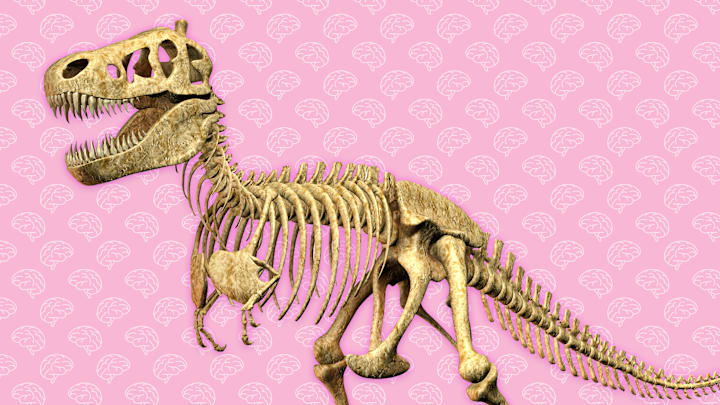Tyrannosaurus rex is one of the most iconic and widely studied dinosaurs, but there is much about the prehistoric apex predator we don’t know. Paleontologists still wonder about the function of its comically short arms, for example, with some arguing they were used as close combat weapons, and others musing that they played a role in mating.
T. rex’s intelligence presents another unsolved mystery. In 2023, a study from Vanderbilt University led by neuroscientist Dr. Suzana Herculano-Housel found the dinosaur’s brain had an extraordinarily high number of neurons—over 3 billion, which is more than a baboon—suggesting that the reptile, often portrayed in pop culture as a mindless killer, would have been as smart as a primate, or maybe even smarter.
Intelligence is often synonymous with brain size, and T. rex brains, believed to have weighed around 350 grams, were among the largest of all non-avian dinosaurs [PDF]. Still, the idea that this murder machine would have had the monkey-like mental capacity to use tools and transmit knowledge was only the beginning of this particular line of inquiry. A new study, published in April 2024 in the journal The Anatomical Record, analyzes a wider array of factors to assess T. rex’s smarts and proposes that the Late Cretaceous carnivore’s intelligence was more on the level of a crocodilian.
The authors, an international team of paleontologists, neuroscientists, and behavioral scientists, argue that brain size and neuron numbers aren’t enough to determine dinosaur intelligence, and should be weighed against factors like anatomy, environment, and fossils that indicate the animals’ movements to reach a more dependable conclusion.
“Neuron counts are not good predictors of cognitive performance, and using them to predict intelligence in long-extinct species can lead to highly misleading interpretations,” Dr. Ornella Bertrand, a mammalian paleontologist at the Institut Català de Paleontologia Miquel Crusafont and one of the 2024 study’s co-authors, explained in a statement.
The new findings suggest that the earlier study overestimated the number of neurons in T. rex brains, and that this number should be placed in the context of the dinosaur’s overall size. While adult baboons weigh between 30 and 88 pounds, a fully grown T. rex could weigh as much as 15,000 pounds, meaning it would have needed a proportionately larger number of neurons to maintain basic biological functions, leaving little room for boosted mental capacity.
“The possibility that T. rex might have been as intelligent as a baboon is fascinating and terrifying, with the potential to reinvent our view of the past,” co-author Dr. Darren Naish, a paleozoologist at the University of Southampton, said in the same statement. “But our study shows how all the data we have is against this idea. They were more like smart giant crocodiles, and that’s just as fascinating.”

